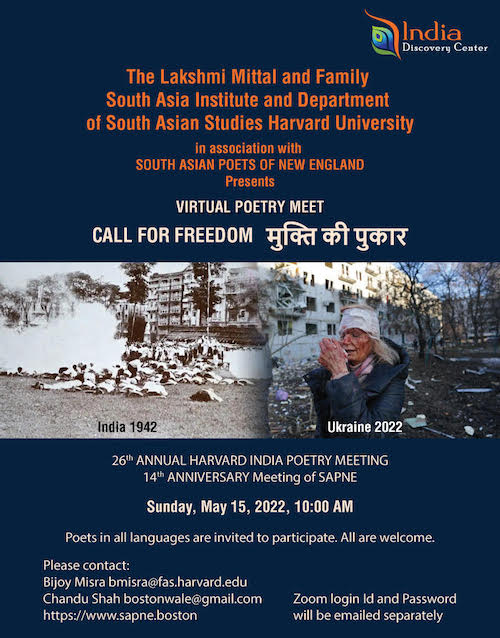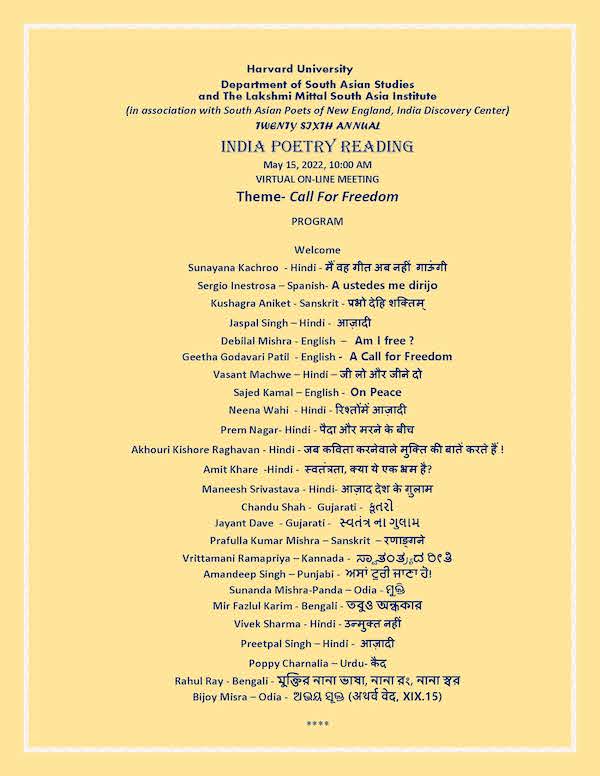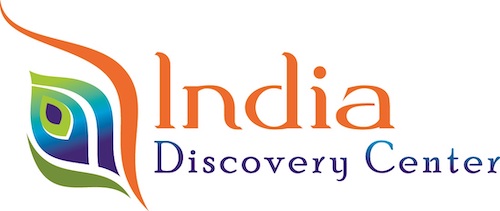Contribute
| Multi-Language Poet Assembly At Harvard - 26th Annual India Poetry Reading 'Call For Freedom' |
Geetha Patil and Amandeep Singh
07/13/2022
Multi-Language Poet Assembly at Harvard - 26th Annual India Poetry Reading 'Call for Freedom' Man is born free and but is put in chains through economic, military or social might in the modern world. There is food insecurity, water insecurity, health insecurity, over all topped by air insecurity. Insecurity is imposed through arbitrary exploitation of nature with little regard to sustenance. While the man on the street is calling for food, the planet is calling for air to breathe. We hear the Call for Freedom The Lakshmi Mittal and Family South Asia Institute and Department of South Asian Studies Harvard University in association with South Asian Poets of New England (SAPNE) organized its 26th Harvard India Poetry Reading as a virtual poetry meet on Sunday, May 15, 2022. Twenty poets in Boston, one in New York, another in Chicago and two in India joined in the annual meet. Languages spread from Kashmiri in the hills to Spanish in the oceans, a dozen in all. About fifty attendees enjoyed the two-and-a-half-hour program ending in a thirty-minute discussion on poetry and poetics. After a brief welcome by the Convener Bijoy Misra, the poets participated in the program in a pre-selected sequence. Sunayana Kachroo, a Kashmiri poet opened the program with a Kashmiri/Hindi/Urdu poem, मैं वह गीत अब नहीं गाऊंगी (I won’t sing That Song). Kashmiri are evicted from their homes and appear as permanent refugees. The poet laments on the condition of her motherland Sergio Inestrosa followed with a Spanish poem, A ustedes me dirijo (I am addressing You). His poem was a protest against people resorting to violence and killing. Kushagra Aniket read his Sanskrit poem, पà¥à¤°à¤à¥‹ देहि शकà¥à¤¤à¤¿à¤®à¥ (O Lord, give me Strength!). It was a call for freedom in a spiritual sense. Only the inner strength can lead us towards the spiritual liberation. Debilal Mishra, from India, recited an English poem, ‘Am I free?’ The real freedom lies within. Freedom in its essence is a positive experience. Only overcoming negativity may lead to freedom. Geetha Patil presented her poem entitled ‘A Call for Freedom.’ Everyone wishes to be free and to enjoy freedom. It is blissful when enjoyed in one’s own land amidst one’s own people. Vasant Machwe recited a poem in Hindi जी लो और जीने दो (Live and Let Live). The poet rebels against the cruelty to animals used for entertainment and slaughter. All must remember that freedom is in letting others live. Sajed Kamal recited his English poem, ‘On Peace.’ The world is dominated by the forces of oppression and conflicts resulting in wars. Let us contemplate for freedom and peace. Neena Wahi recited her Hindi poem, रिशà¥à¤¤à¥‹à¤‚में आज़ादी (Freedom in Relationship). A mother sacrifices her life to raise her children. Siblings' love is sweet and innocent but they need the freedom to keep their relationship alive in spite of differences in social status. Prem Nagar recited a Hindi poem, पैदा और मरने के बीच (Between Birth and Death). We are born to die, but inbetween these natural realities, we want to live free. So is the desire in spite of many handicaps. Akhouri Kishore Raghavan, followed with another presented his Hindi poem, जब कविता करनेवाले मà¥à¤•à¥à¤¤à¤¿ की बातें करते हैं ! (When Poets shout for Freedom!). His poem reflected the impact of poetry on "Jan-jaagaran" (in the context of 1942) and compared with the modern era information systems that are useful in shaping/re-shaping the opinion of the masses (in today’s context). Amit Khare read his Hindi poem, सà¥à¤µà¤¤à¤‚तà¥à¤°à¤¤à¤¾, कà¥à¤¯à¤¾ ये à¤à¤• à¤à¥à¤°à¤® है? (Is Freedom a Misnomer?). The poem was filled with questions to know the importance of freedom of others and that of ours. Do we do our duties while living in freedom? Maneesh Srivastava had a collection of Hindi Haikus titled आज़ाद देश के ग़à¥à¤²à¤¾à¤® (Shackles in a Free Country) and then recited a Hindi Poem सांस लेना कà¥à¤¯à¥‹à¤‚ मना है (Why Can’t I Breathe?) The poet questioned freedom in a country where people are still shackled. Chandu Shah presented his Gujarati poem, કૂતરો (A dog)). A dog in chain looks for freedom. Are humans any different? Jayanta Dave followed up with another Gujarati poem, સà«àªµàª¤àª‚તà«àª° ના ગà«àª²àª¾àª® (Free or Slave?) Is freedom an absolute state or is it a relative measurement like the theory of relativity of Einstein? Prafulla Kumar Mishra presented his Sanskrit poem रणाङà¥à¤—ने (In the Battlefield). A battlefield throws away one’s identity. One hardly distinguishes mother and daughter, one’s son or father. Vrittamani Ramapriya read his Kannada poem, ಸà³à²µà²¾à²¤à²‚ತà³à²°à³à²¯à²¦ ರೀತಿ ( Ways of Freedom). This poem, composed in the ‘Ragale’ meter of Kannada. poetry, spoke of with open hearts and having compassion towards others. It drew comparison with the declaration of Rama in ridding the world of demons from the land of Kalinga. Amandeep Singh recited his Punjabi poem, ਅਸਾਂ ਟà©à¨°à©€ ਜਾਣਾ ਹੋ! (We will keep Marching On). Willpower and determination are the driving force. Do march without bothering about the hurdles are on the road! Sunanda Mishra Panda presented her Odia poem, ମàକàତି (Freedom). A soul wishes to be free from mortal bondage but lives in the unreal with falsehood and desires. Enlightened minds lift the clouds to get a clear sky. Mir Fazlul Karim read his Bengali poem, তবà§à¦“ অনà§à¦§à¦•à¦¾à¦° (Still it is dark!). The earth spins and knowledge progresses. The world is still dark with conflicts, animosity and slaughter! Vivek Sharma, presented a poem in Urdu, उरà¥à¤¦à¥‚ (Urdu!). Urdu is a language of freedom, created for use on the street or in the court. Urdu is there when you speak your heart or you dictate rules. Poppy Charnalia followed with an Urdu poem, कैद (Imprisonment!). The label of imprisonment is itself a declaration of freedom when one known what the limits are. The sky has its own limits and the imprisonment creates its own limits. Bijoy Misra recited his Odia poem, ଅà¬àŸ ସà‚କàତ, translation from Sanskrit Atharva Veda (Freedom from Fear). Confronted with danger or terror, one is lonely and helpless. One prays for more powerful metaphysical forces to create a rescue path. There was a short discussion among the participants about the presentations and the efforts. There was uniform praise and appreciation from all. The poems were indeed of high quality and could serve as material for future literary analysis. A visitor commented “These talented poets practically blew us away with their amazing poems. Thanks for making our Sunday morning grander!†The video of the morning is created by Mr. Maneesh Srivastava in contract with Paschim Productions. The link to the video is https://www.youtube.com/watch?v=u2tTJH6PWow&t=1s The next event of SAPNE is on August 21 and will deal with the Folk Literature and Oral Poetry. The SAPNE information is at https://www.sapne.boston
You may also access this article through our web-site http://www.lokvani.com/


